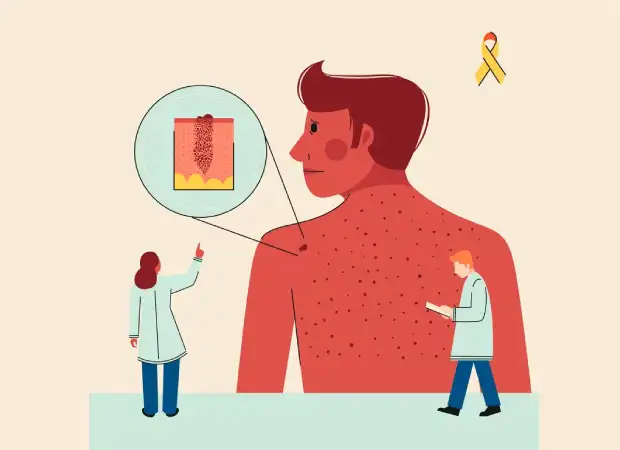If you are seeking the removal of skin tags, consult a dermatologist in South Delhi and receive a tailored treatment plan. The best, most effective, and reasonably priced skin tag removal is available at Soul Derma. Request for an appointment to get rid of these unwanted skin growths from your neck, underarms, and body.
Skin tags, medically termed acrochordons, are small, benign, harmless, skin-colored growths. They are small pieces of soft, dangling skin with stalks or peduncles. Their core is made of skin structural fibers and ducts, fat cells, and nerve cells, and covers the area of the epidermis.
Other names of skin tags include cutaneous tag, cutaneous papilloma, fibroma molluscum, soft fibroma, fibroepithelial polyp, fibroma pendulum, fibroma molluscum, and Templeton skin tags. At Soul Derma, skin tags on the neck and skin removal is performed using state-of-the-art technologies. You can contact the experts for more details on skin tag removal in South Delhi.

A skin tag often appears like a cluster of skin tissue, with a smooth or irregular texture, budding out of a tiny, fleshy stem. Typically, it is skin-colored or darker than neighboring skin color, looking just like a raised mole. Its size typically ranges between 1-5 mm in diameter and rarely may grow to be of few centimeters.
There is no definite cause of skin tags. Skin tags may form due to any of the following contributing factors:
Skin tags mostly develop in the following areas:
How do skin tags spread? Are they caused by a virus? The answer to this is - no. There is no evidence suggesting that skin tags can spread from one person to another.
A brief evaluation of the affected area and a review of patient and family history, is done by
best skin tag treatment doctor in South Delhi to diagnose a skin tag. To rule out other conditions that resemble skin tags such as moles, skin cancer, warts, skin diseases, and others, a thorough skin examination and sometimes a skin biopsy is conducted.
Mostly, skin tags aren’t painful. But they can turn painful if they are sore or irritated because of rubbing or friction.
A person with skin tags should consult a skin specialist if the tags get bigger, start to bleed, cause discomfort, or affect large body areas. If skin tags are on exposed areas of the body and their appearance is bothersome, the person should consider skin tag removal. The skin tag removal in South Delhi at Soul Derma is performed after the application of numbing cream, so this makes the treatment comfortable.
Some dermatological procedures to remove skin tags include:
Some popular natural ways to remove skin tags include:
At present, there are no medically approved products available to effectively remove the skin tags. It's not recommended or can be unsafe for a person to use over-the-counter tag removal options like nail polish, tea tree oil, hair removal creams, wart removal solution, or nail clippers. Such options come with more chances of complications.
If skin tags are eliminated from the skin, they are not likely to grow back. There is no evidence that skin tag removal will result in more tags to grow but there could be chances that new skin tags develop.
Some preventive measures are there for skin tags, including:
Soul Derma is a leading skin clinic for skin tag removal that has the best skin specialists to provide advanced skin tag removal treatments from various body locations like the neck, buttocks, eyelids, groin folds, and underarms. Based on the type and location of skin tags, the skin tag removal cost in South Delhi is determined, as sometimes surgery or different treatments or technologies are offered. The doctor also ensures minimal discomfort during the procedure.
If you are looking for a skin tag removal clinic near you, then meet the skin experts at Soul Derma Clinic.
Ground Floor W-58, Greater Kailash I, New Delhi, Delhi 110048 India